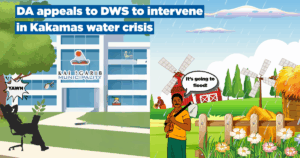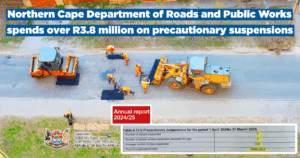Oversight conducted by the Democratic Alliance (DA) confirms that learners, parents, educators, principals, and local businesses are paying the price for financial mismanagement and poor prioritisation by the Northern Cape Department of Education.
Parents and guardians taking their children to school this week were met with unprecedented requests for stationery, cleaning materials, and other items as the department failed since 2024 to pay funding for learning and teaching support materials, maintenance, food schemes, and other essentials. While the department admitted its failure, it only committed to partial payment of outstanding monies. School communities are left scrambling to cover unexpected costs. As the department only paid 27% of schools’ funds for learning and teaching support materials, classes are left without stationery. Grade 12 learners at a Kimberley-based high school have been sitting on their hands since the academic year started, because the school lacks textbooks and cannot afford paper to make copies.
Schools also receive only 35% of their hostel subsidies for two quarters, creating serious financial shortfalls at very short notice. One hostel near Calvinia resorted to sending learners home over the weekends, because the school cannot afford to pay staff and provide food for two non-school days. But not all parents can afford additional transport costs.
Educators are under immense pressure to keep classes afloat from their own pockets. Yet without funding, schools are not necessarily able to pay educators their salaries. A school in Daniëlskuil was forced to use funding intended for salaries in 2025, to pay operational costs in 2024.
Without funding, schools cannot provide the security needed to prevent vandalism and theft. Schools in Ritchie attest to the frequency of break-ins and vandalism after hours and during school holidays.
Most schools visited by DA representatives are unable to pay municipal accounts timeously. A school in Keimoes also struggles to afford prepaid electricity. Without electricity, the school’s pumps cannot draw sufficient water from the reservoir for hostel learners.
While the department urges schools to engage with service providers, prioritise critical needs and plan conservatively, some schools have already been turned away by local businesses due to high debt levels and will find it impossible to make alternative arrangements without sufficient funding. It is also unrealistic to expect local businesses to subsidise schools indefinitely. I know of one business that hasn’t been paid for six months for school printing services. Why must it pay for the department’s failures?
The department could easily find the funds to cover essential education services if it improved its abysmal financial management. In the last financial year, the department frittered away over R647 million in irregular, fruitless and wasteful expenditure. While one school in Ritchie only had enough supplies to feed children from an impoverished community for two days, the department upped its spending on its own catering for officials by 50%. And while schools are left without pens and paper, the department splashed out on gifts worth more than R3.5 million.
We question the wisdom behind lavish gala events to celebrate the lowest matric pass rate in the country for the second consecutive year. Surely this funding could have been used to assist schools in impoverished communities, where parents cannot afford to feed their families, let alone afford to carry schools on their unemployed backs.









